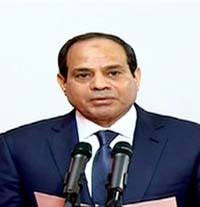
Reuters, Cairo :
Former army chief Abdel Fattah al-Sisi was sworn in as president of Egypt on Sunday in a ceremony with low-key attendance by Western allies concerned by a crackdown on dissent since he ousted Islamist leader Mohamed Mursi last year.
Last month’s presidential election, which officials said Sisi won with 97 percent of the vote, followed three years of upheaval since a popular uprising ended 30 years of rule by former air force commander Hosni Mubarak.
Security in Cairo was extra tight, with armoured personnel carriers and tanks positioned in strategic locations as Sisi swore to protect Egypt’s republican system, unity, law and the interests of its people before a panel of judges at the Supreme Constitutional Court.
Commentators on state and private media heaped praise on him, turning a blind eye to what human rights groups say are widespread abuses, in the hope that he can deliver stability and rescue the economy.
Many Egyptians share that hope, but they have limited patience, staging street protests that toppled two leaders in the past three years, and the election turnout of just 47 percent shows Sisi is not as popular as when he toppled Mursi.
Western countries, who hoped the overthrow of Mubarak in 2011 would usher in a new era of democracy, have watched Egypt’s political transition stumble. Mursi was the country’s first freely elected president, but his year in power was tarnished by accusations that he usurped power, imposed the Brotherhood’s views on Islam and mismanaged the economy, allegations he denied. After Sisi deposed him and became Egypt’s de facto ruler, security forces mounted one of the toughest crackdown on the Brotherhood in its 86-year history. Hundreds were killed in street protests and thousands of others jailed. Secular activists were eventually thrown in jail too, even those who supported Mursi’s fall, because they violated a new law that severely restricts protests.
Mursi’s ouster was applauded by Egypt’s Gulf Arab allies, who were alarmed by the rise of the Brotherhood, the international standard-bearer of mainstream Sunni political Islam.
The movement, which won nearly every election in Egypt since Mubarak’s fall, is seen as a threat to Gulf dynasties. Saudi Arabia, the United Arab Emirates and Kuwait pumped billions of dollars of aid into Egypt after Sisi appeared on television and announced that the Brotherhood was finished.
King Abdullah of Saudi Arabia urged Egyptians this week to back Sisi and said they should disown “the strange chaos” of the Arab uprisings. Kuwait’s Emir, the King of Bahrain, the Crown Princes of Saudi Arabia and Abu Dhabi are attending Sisi’s inauguration, according to a list provided by the Egyptian presidency.
In contrast, the United States only sent a senior advisor to Secretary of State John Kerry and most European countries only planned to send ambassadors.
Diplomatic manoeverings pale as a problem for Sisi compared with an urgent need to fix state finances and tackle an Islamist insurgency to lure back tourists and investors.
Officials forecast economic growth at just 3.2 percent in the fiscal year that begins July 1, well below levels needed to create enough jobs for a rapidly growing population and ease widespread poverty.

